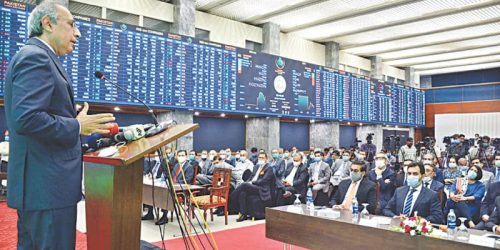KARACHI: Finance Adviser Dr Abdul Hafeez Shaikh struck a gong at the stock exchange on Monday to mark the listing of the Pakistan Energy Sukuk II (PES-II) worth Rs200 billion.
The government issued the 10-year Islamic bond back in June through its wholly owned company, Pakistan Holding Ltd, to generate cash for overdue payments in the power sector. Its listing on the stock exchange means investors can buy and sell the Shariah-compliant instrument having a face value of Rs5,000 in the secondary market.
“Raising Rs200bn through competitive bidding is a big development. Its borrowing cost is significantly less than that of PES-I that was issued in 2019,” he said. As a result, the government managed to raise funds for the first time at a rate that’s less than the Karachi Interbank offered Rate (Kibor).
The instrument will pay investors a return of six-month Kibor minus 10 basis points (0.1 per cent) on a semi-annual basis. In contrast, debt servicing on last year’s PES-I was six-month Kibor plus 0.8pc. The government will thus save Rs1.8bn on the latest sukuk every year for the next decade.
In his speech and subsequent interaction with the press, Dr Shaikh cherry-picked economic indicators like non-tax revenue growth and social sector spending to defend the government’s performance. He skirted around key questions such as the circular debt, economic contraction and decrease in per-capita income.
For example, last year’s PES-I, which was issued with the same objective of curtailing the circular debt, failed to make any dent in its accumulation. The circular debt instead grew more than one-third or Rs538bn in FY20.
Similarly, the adviser dodged multiple questions about the recently announced Karachi package of Rs1.1 trillion. Despite repeated prodding, he did not say anything about either the share of the federal government or the planned sources of funds for such a massive endeavour.





